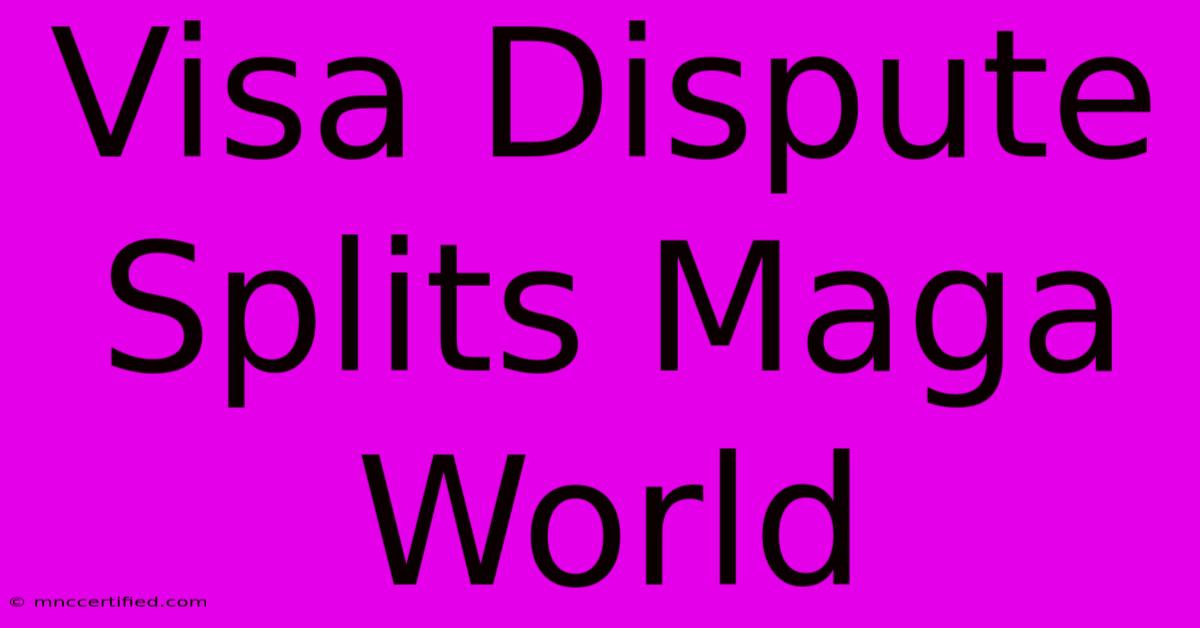Visa Dispute Splits Maga World

Table of Contents
Visa Dispute Splits MAGA World: Loyalty, Partisanship, and the Power of the Purse
The recent controversy surrounding a major credit card company's decision to restrict certain services for businesses deemed to promote or support certain political ideologies has ignited a firestorm within the MAGA (Make America Great Again) world. This isn't just a business dispute; it's a revealing glimpse into the complex interplay of loyalty, partisanship, and the increasingly powerful role of financial institutions in shaping political discourse. This article will delve into the details of the dispute, its impact on the MAGA movement, and the broader implications for political activism and financial freedom.
The Spark: A Credit Card Controversy
The core issue revolves around a large credit card processor's decision to limit services to businesses associated with the MAGA movement or specific political figures. While the exact details of the policy remain somewhat opaque, the central argument is that these businesses engage in activities violating the company's terms of service, often related to promoting or inciting violence, hate speech, or misinformation.
This move, however, hasn't been received quietly. Many supporters of these businesses view the decision as a form of censorship and an attack on free speech. They see it as a blatant attempt by a large corporation to silence dissenting voices and control the narrative. The outcry is significant, highlighting the deep-seated mistrust many within the MAGA community harbor towards large institutions they perceive as being inherently biased against conservative viewpoints.
The Arguments: Censorship vs. Corporate Responsibility
The debate is sharply divided. Supporters of the credit card company's actions argue that corporations have a responsibility to uphold ethical standards and refuse service to businesses that promote hate speech, violence, or misinformation. They believe that protecting their platform from such activities is a crucial part of responsible business practices.
Conversely, opponents claim this action constitutes censorship and a blatant violation of free speech principles. They argue that businesses should be free to operate without fear of reprisal from powerful corporations merely for expressing their political views, regardless of how unpopular those views might be. They highlight the potential for this type of action to stifle political dissent and create an uneven playing field.
The MAGA Response: Boycotts and Backlash
The response from the MAGA community has been swift and multifaceted. Many have called for boycotts of the credit card company and its affiliates, urging supporters to switch to alternative payment processors. This demonstrates the significant buying power of this segment of the population and its willingness to leverage that power to express political dissatisfaction.
Social media has exploded with discussions, debates, and accusations. The hashtag #[InsertRelevantHashtagHere] has become a rallying cry, further amplifying the controversy and mobilizing supporters. The intense emotional response underscores the deeply personal nature of this dispute, extending beyond mere business concerns into the realm of identity and political belonging.
Long-Term Implications: Political Polarization and Financial Control
This dispute exposes a growing tension between corporate social responsibility and free speech. It also raises concerns about the potential for large corporations to wield significant influence over political discourse through their control of financial systems. The long-term implications are significant, potentially influencing future political activism and the dynamics of political campaigning.
The extent to which this controversy will reshape the political landscape remains to be seen. However, it serves as a stark reminder of the intertwined nature of politics, business, and individual liberties in the digital age. The battle lines are drawn, and the conflict's outcome will likely have far-reaching consequences.
Conclusion: Navigating the Shifting Sands of Political Activism
The Visa dispute offers a fascinating case study in the complexities of modern political activism. It showcases the power of both corporate action and consumer response in shaping political discourse. The debate surrounding censorship, free speech, and corporate responsibility is far from settled, and this controversy is likely to be a significant chapter in the ongoing evolution of political engagement in the digital age. Understanding these dynamics is crucial for navigating the increasingly complex and often contentious political climate.

Thank you for visiting our website wich cover about Visa Dispute Splits Maga World. We hope the information provided has been useful to you. Feel free to contact us if you have any questions or need further assistance. See you next time and dont miss to bookmark.
Featured Posts
-
Brown Explodes For 44 Celtics Triumph
Dec 28, 2024
-
Boxer Paul Bamba Dies Suddenly
Dec 28, 2024
-
Highlights Mavericks Vs Suns Game
Dec 28, 2024
-
Football Usc Defeats Texas A And M 35 31
Dec 28, 2024
-
Remembering Olivia Hussey A Legacy Remembered
Dec 28, 2024